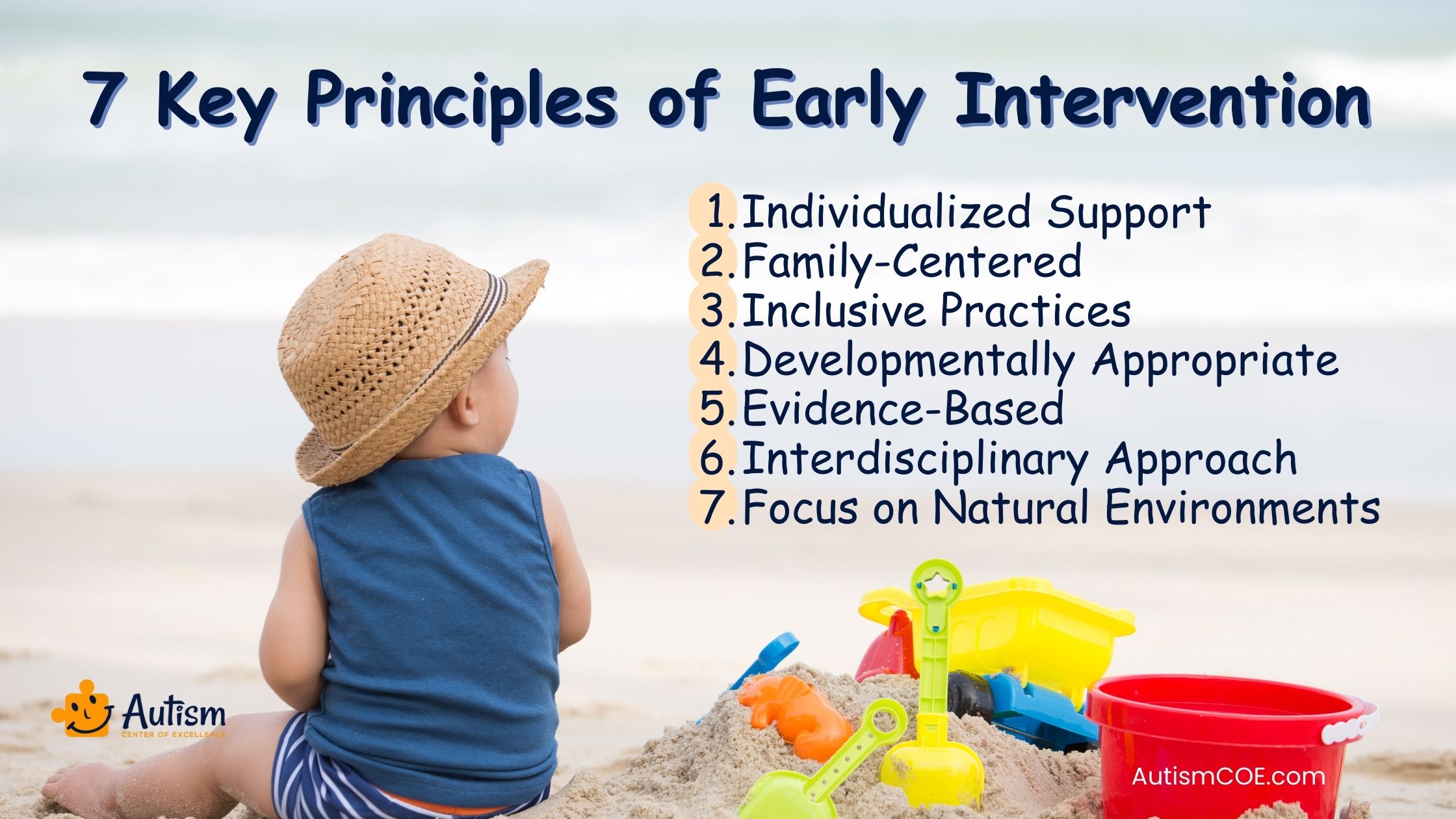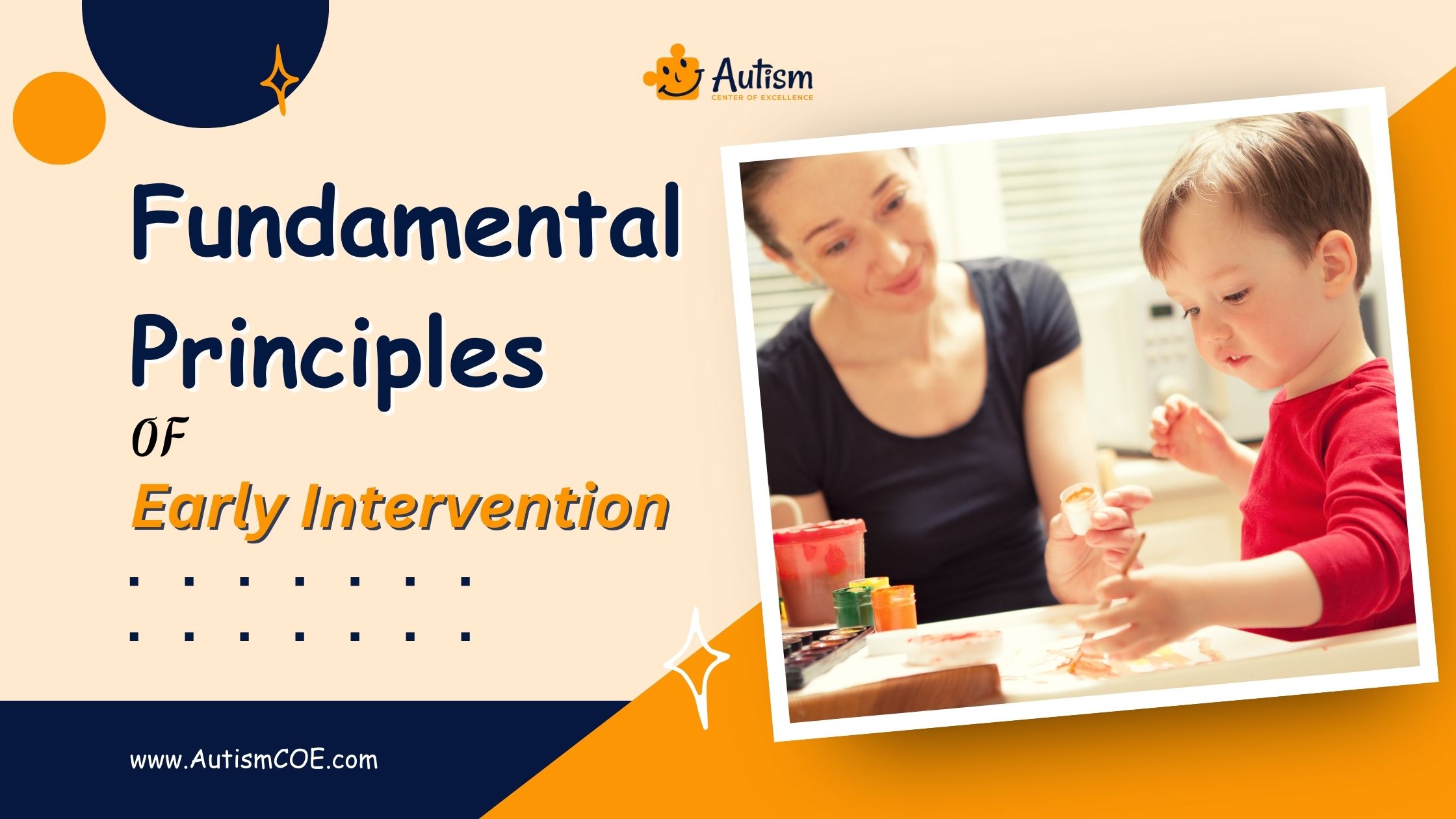Early Intervention, placed into the tapestry of a child’s development becomes a vital thread of strength, resiliency, and hope for children and families, who are navigating through developmental challenges. Either for developmental delays, disabilities, or conditions such as Autism Spectrum Disorder (ASD), Early Intervention represents a light of success and promise. The post is aimed at unveiling the basic Principles of Early Intervention that help parents, educators, and pediatricians encourage the development and learning of children.
What Is Early Intervention and Why Is It Important?
The term early intervention describes the services and support that are delivered to infants and young children who present Developmental Delays and Disabilities and their families. It is based on the fact that most growth and learning occur during the first few years of life, which also makes this period crucial for intervention.
The significance of early start cannot be overemphasized. Early, focused interventions can alter the development trajectory of children and consequently improve outcomes for the children, their families, and the communities.
- It can strengthen growth in a number of areas, such as cognitive, behavioral, social, emotional, and physical.
- Early intervention addresses needs and reduces the likelihood of need in later life, allowing progress to be made in self-sufficiency and independent living.

7 Key Principles of Early Intervention
For the effective development and well-being of young children, early intervention builds upon seven foundational principles which help practitioners and families to work collaboratively in a personalized way.
Individualized Support
All children are unique and have their own blend of talents and trials. At the heart of early intervention lies a fundamental principle: individualized needs-oriented services provided for each child and their family in a holistic manner. This critical orientation requires the creation of detailed and well-planned programs that will not only be adjusted to the child’s preferences, learning style, and cultural background, however, will also cultivate an atmosphere of support and care.
This personalized approach enables Early Intervention Specialists to guarantee that every child is helped as effectively as possible, leading to their future success and happiness. This approach is focused on the holistic method, which appreciates the child in the context of their family and community, and encourages cooperation in the achievement of the best possible outcomes.
Family-Centered
Family is the foundation of the effective functioning of Early Intervention Programs. Their function should not be underestimated, since programs that go with a family-centered approach do not only acknowledge, but also, give power to parents and caregivers to be the key teachers and decision-makers in their child’s development process. This strategy is based on the fundamental principle of intense cooperation and partnership with families.
Doing this, it helps families by being given with the appropriate support, resources, and information to enable them to make the correct decision about their child’s care and education. This type of model recognizes the special knowledge and experiences parents have and implies that their cooperation is essential in developing an individualized and Successful Intervention Plan, responding to the needs of an individual child and families.
This team-model approach creates a friendly atmosphere, where families are appreciated and understood, and actively engaged in their child’s growth, which in turn results in more meaningful and effective results.
Inclusive Practices
Inclusion is one of the major Pillars of Early Intervention and mainly promotes the smooth inclusion of children with developmental challenges in the mainstream of education with their peers. Such practice enables these children to develop a high sense of belonging in their environment and offers them a variety of opportunities for socialization processes.
In addition, in a very big way, it makes access to varied and quality learning experiences extremely easy, hence, making sure that all children are exposed to a rich and stimulating educational environment that is customized to meet their unique needs and potentials, even those in Special Education. In doing so, educational systems will develop more tolerant, understanding, and varied learning environments that respect differences and offer equal access to development.
Developmentally Appropriate
The interventions employed must be individualized, taking into account the child’s age, and developmental stage. This systematic customization provides tasks, that are challenging in just the right amount – not too easy to promote the growth, but not too hard to create frustration or disinterest.
This approach allows us to create an atmosphere that promotes continuous development, builds self-esteem, and keeps the child actively involved in the learning process, thus supporting the Child’s Developmental Journey.
Evidence-Based
The Best Early Intervention approaches involve strategies that are thoroughly and substantively researched. Evidence-Based Practices are characterized as approaches that are highly scientifically tested and they are known to yield favorable results. The scientific validation makes sure that time and resources are not spent but are well invested in methods that are proven to work efficiently.
Such strategies not only help to optimize the impact of the interventions but also give the development of trust and reliability in the applications of these practices, providing the best results possible for the possessed.
Interdisciplinary Approach
An inter-disciplinary approach usually characterizes early intervention that is a shared effort, involving a group of professionals from different disciplines. This holistic approach ensures that a complete picture of the child’s needs is obtained, with the help of all the varied knowledge that educators, therapists, psychologists, and pediatricians have to offer. Each professional provides a diverse angle, which in turn, guarantees that the child receives comprehensive assistance.
For example, teachers can give information about learning styles and educational techniques, physical and speech challenges can be discussed by therapists, psychological development can be taken care of by psychologists, and the overall health of the child can be managed by the pediatric –path.
On the whole, this team develops a comprehensive program that encompasses all the elements of child development, thus, the early intervention is more efficient and customized to the child’s needs.
Focus on Natural Environments
Support in natural environments, that is, settings similar to those of a child’s age peers without disabilities, not only increases the relevance of learning but also greatly improves the transferability of newly learned skills. This idea may include providing targeted Early Intervention Services in diverse places including the child’s home, his or her pre-school, or in Community Settings such as parks, and libraries.
The practice and application of skills in daily situations that the child encounters every day will ensure that the development is more holistic. This approach also enables learning to be an interesting activity for the child by combining education with their normal habits and environments, thus reinforcing the practical application of skills in daily life.
Join Our Weekly Newsletters!
Subscribe now to stay updated with our latest email updates.
Frequently Asked Questions & Answer
Who Provides Early Intervention Services?
Early Intervention Services are provided by a team of professionals from various disciplines which include special education, therapy (physical, occupational, speech-language), psychology, and pediatric medicine. The particular teaming is individualized for each child.
What is the Primary Focus of Early Intervention?
The focal point of early intervention is to offer children with developmental delays, disabilities, autism, or those that are at risk of such delays, services and support, to enhance their development and well-being during their critical early years of life.
What is the Best Practice in Early Intervention?
The relevant early intervention practice is the family-centered model that understands and includes the family’s values, beliefs, and culture, with an emphasis on teamwork and cooperation between the family and professionals in the support of child development.
What Outcomes Can Be Expected from Early Intervention?
Although results differ from one child to another, early intervention can make a child’s physical, cognitive, communication, social/emotional, and adaptive development better to a greater extent. Support that comes when needed is what can make them successful at school and later in life.
Conclusion
The Principles of Early Intervention set a platform for children with developmental disabilities to achieve their maximum. Although the road may be uncertain, these principles are the guiding light that shows the way ahead – with every step tuned to the growth rhythm of the child.
The contributions of parents, educators, and pediatricians are crucial in this endeavor, with their extreme faith and love towards every child making them the proponents of Early Intervention. By sticking to these core principles, we create an environment that is more inclusive, respectful, and understanding that provides for every child to thrive.
To sum up, therefore, it is vital to bear in mind that early intervention, a key focus of AutismCOE, is more than a method but an unwavering devotion to realizing possibilities, supporting growth, and honoring the rich mosaic of human capacity.
Please Note: The content of this blog is for informational purposes only and should not be considered a substitute for professional medical advice, diagnosis, or treatment. Consult a qualified healthcare professional for personalized guidance tailored to your specific situation.

Bhavika Bhasin
Bhavika Bhasin is the Research and Marketing officer at AutismCOE. She works with children and adults with ASD. Her clinical research includes evaluating various available autism screening and diagnosis methods and their efficacy. She is currently developing a novel screening exam that is indicated to be more accurate than the existing available exams. She is also writes articles papers for various publications.


